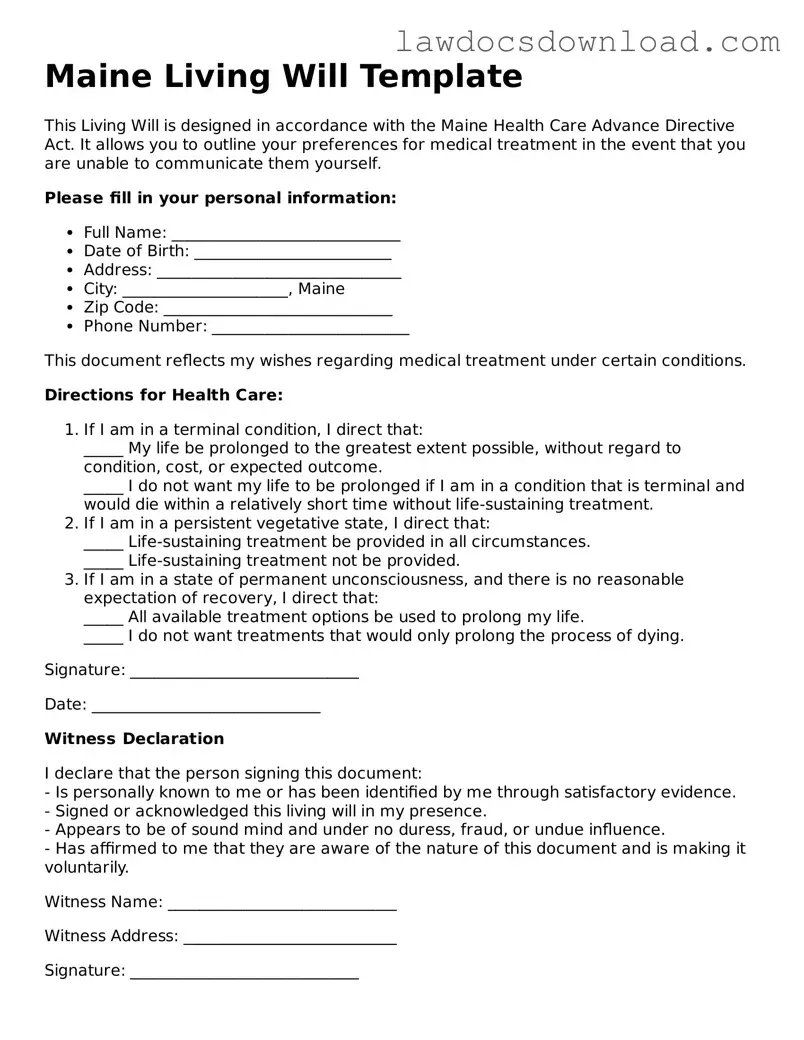In Maine, creating a Living Will is a crucial step in planning for the future. However, during this process, several common mistakes can significantly impact the document’s effectiveness. First and foremost, many individuals neglect to complete the form entirely, leaving sections blank. This oversight can lead to ambiguity, making it difficult for healthcare providers and loved ones to honor one's wishes. It's essential to fill out every part of the form to ensure all preferences are clearly stated and understood.
Another frequent error is failing to discuss the contents of the Living Will with family members and healthcare providers. Communication is key in ensuring that one's wishes are respected. When individuals do not share the specifics of their Living Will, it creates uncertainty and confusion in critical moments. It’s advisable to have open discussions with loved ones and medical professionals about the desires laid out in the document, ensuring everyone is informed and prepared to act according to one’s wishes.
Many people also mistakenly believe that once the Living Will is signed, it never needs to be revisited. However, wishes and circumstances can change over time. It is crucial to update the Living Will as life situations evolve, such as after a diagnosis of a serious illness, a change in marital status, or the birth of a child. Regularly reviewing and updating the document ensures that it accurately reflects current preferences.
A significant oversight is not properly executing the document according to Maine law. For a Living Will to be legally valid, it must meet specific state requirements, such as being witnessed or notarized. If these legal formalities are not correctly followed, the document might not be recognized in a legal setting, undermining its purpose.
Another mistake is assuming a Living Will is the same as a Power of Attorney (POA) for healthcare. While both documents are essential for healthcare planning, they serve different purposes. A Living Will outlines one's wishes for medical treatment, whereas a POA for healthcare appoints someone to make healthcare decisions on one’s behalf. Confusing these two can lead to significant gaps in planning.
Frequently, individuals fail to make their Living Will accessible. It’s crucial that the document can be quickly retrieved when needed. Keeping it locked away in a safe deposit box or an unknown location can delay its use in an emergency. Copies should be readily available to trusted family members, healthcare providers, and included in personal medical records.
Some people overlook the need to include specific directives for different medical scenarios. A common error is providing instructions that are too vague or broad. Clearly detailed wishes for various medical situations, including life-sustaining treatments and end-of-life care, ensure that healthcare providers can make decisions that align with one’s preferences.
Last but not least, a frequent mistake is not consulting with a legal professional. Although not always required, getting legal advice can help clarify the process and ensure the Living Will meets all legal standards. This can prevent potential issues and ensure that one’s wishes are honored in the manner intended.

